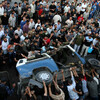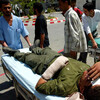
Nahr al-Bared Flees to Beirut
26 May 2007
As we walked in to Shatila refugee camp in Beirut this morning we were approached by a family from Nahr al-Bared refugee camp in Tripoli who was wandering the streets of the camp in search of a place to live. They fled the violence in their camp and made it to Beirut to seek shelter. This family is one of 100 families who are now residing in Palestinian homes inside Shatila camp, with around 30 people to each two-room flat on top of the already family living in these homes and some of these homes have no electricity. Read more about Nahr al-Bared Flees to Beirut








